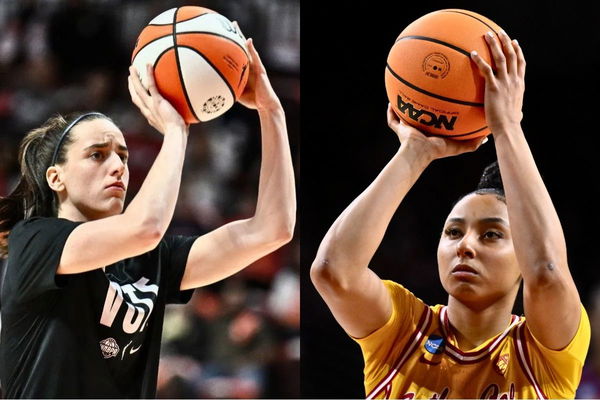

Caitlin Clark’s arrival in the WNBA was anticipated to make waves, and she delivered, drawing record-breaking viewership this season. This impact was hardly surprising, considering the immense popularity the Fever star cultivated during her four years at Iowa. Now, women’s basketball has another rising star in Juju Watkins, whose fame is growing at an impressive pace. Well, both players have aptly leveraged a unique aspect of the WNBA, shaped by its CBA rules—a difference from the NBA that USC’s head coach has emphasized.
Juju Watkins and USC Trojans head coach Lindsay Gottlieb recently appeared on the Good Game with Sarah Spain podcast, diving into the evolving world of women’s college basketball and its rising stars. However, there was a moment when the host shifted focus to a key difference between the NCAA women’s and men’s game. Unlike NBA players, who can go pro after just one year in college, NCAAW players face a 22-year age requirement before leaping the WNBA.
ADVERTISEMENT
Article continues below this ad
ADVERTISEMENT
Article continues below this ad
While Watkins remained neutral on the rule, her coach, Lindsay Gottlieb, offered a compelling defense of the existing disparity, highlighting how it has been a significant advantage for women’s college athletes, including standout players like Caitlin Clark.
“Yeah, I mean, look, if it was ever better for Juju or any of my players to leave and go pro, I mean, on the men’s side, if there’s an opportunity to make $10 million in their first contract, or even three years later, hundreds of millions of dollars, it’s hard to delay that. But the women’s game has just been so different, right?,” Gottlieb told on Good Game.

via Imago
Southern California guard JuJu Watkins (12) with coach Lindsay Gottlieb during an NCAA women’s tournament game against Kansas at Galen Center.
Many men’s basketball players choose to join the NBA after their freshman year, drawn by substantial contracts. For the 2024-25 season, rookie salaries start at $1,157,153, with Bronny James signing a $7.9 million, four-year deal at age 20. Comparatively, the reigning WNBA RoTY Caitlin Clark signed a four-year contract worth only $338,056, highlighting a significant pay disparity.
The USC head coach noted that the lack of financial incentives and long-term opportunities in the WNBA has made the emphasis on value more significant. She also acknowledged that if the age restriction wasn’t part of the CBA, it likely wouldn’t hold up legally. This inclusion, she added, highlights the league’s unique structure and the challenges posed by its limited roster spots. Gottlieb then highlighted the financial advantages tied to the current CBA rule using Caitlin Clark’s rising stardom as a reference.
“If you look at someone like Caitlin Clark, the platform of women’s college basketball remains bigger. The eyes on the game remain bigger. So the deals that she gets coming into the W and the financial power she has is greater because of the platform she had those last two years in college. If she had left after her sophomore year, she would have been ready basketball wise possibly, but she wouldn’t have brought what she brings. So I think the financial conversations are a lot more nuanced on the women’s side than on the men’s side. “
While head coach cleared her stance, Watkins seemed to be quite in dilemma if the changes are something to be introduced.
Juju Watkins weighs in on the CBA Rule
Juju Watkins has quickly gained momentum during her freshman year and is already emerging as a major rival to Caitlin Clark. Impressively, Watkins scored more points in her debut season than Clark did during her first year at Iowa. College basketball has not only elevated her fame but also secured her lucrative multiyear deals with Nike and other leading brands. However, Watkins remains undecided about whether the CBA rule barring women athletes from entering the pros before age 22 should be revised.
“I want to say personally, I’m enjoying my experience. Coach, you know, I love having coach. I mean, I definitely think we should have the option. There’s just been such a growth in college basketball where it’s like, you know, why would you kind of want to leave? Because you’re able to kind of have that experience and build your brand here in college as well. So I would say we should definitely have the option,” told the Trojans star.
Watkins has already achieved an impressive 15 30-point games, reaching that milestone faster than Caitlin Clark. This success raises the question of whether she might have considered turning pro earlier if the CBA rule didn’t require players to wait until age 22.
But, the 18-year-old mentioned, “But, you know, I think college is a way to prepare us for the pros as well. So, I don’t know, it’s a touchy subject, but I’m for it, I would say.”While the CBA rule remains a debatable issue, as Coach Gottlieb put it, the focus should be on “being smart about what’s best for female athletes long-term.”
ADVERTISEMENT
Article continues below this ad
What’s your perspective on:
Should the WNBA age rule change, or does it protect young stars like Caitlin Clark and Juju Watkins?
Have an interesting take?
ADVERTISEMENT
ADVERTISEMENT
ADVERTISEMENT
ADVERTISEMENT


Should the WNBA age rule change, or does it protect young stars like Caitlin Clark and Juju Watkins?